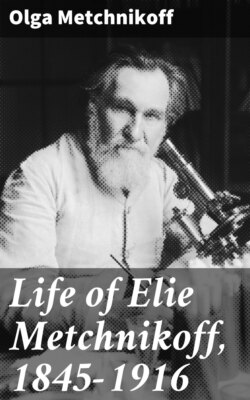Читать книгу Life of Elie Metchnikoff, 1845-1916 - Olga Metchnikoff - Страница 9
На сайте Литреса книга снята с продажи.
CHAPTER V
ОглавлениеTable of Contents
Leo Metchnikoff’s illness—Private tutors—Botanical studies—A memorable birthday.
In 1851, in the middle of the winter, the Metchnikoffs heard that Leo, their second son, was suffering from hip-disease, and the doctors advised that he should be taken away from Petersburg. Poor Emilia Lvovna was in great despair and shed many tears; her brother-in-law, Dmitri Ivanovitch, calmly announced that he was going to fetch Leo. He took his great fur coat, his fur cap and fur-lined boots, and started that very day for Petersburg by coach. He took but the necessary time to go and to bring Leo back, only stopping at relays to change horses.
The boy was then thirteen years old, handsome, gifted, and intelligent; he walked with crutches, but his general health seemed good, and it was decided that he should work at home to prepare for the Lycée, under the tuition of students as tutors. Thus a new element was introduced into the family life.
In 1853 Leo had as a tutor a student named Hodounof, a very intelligent young man, who wished not merely to teach him but to impart to him the love of science. Leo was extremely gifted and worked with great facility, but he lacked concentration and was therefore somewhat superficial. This cooled his tutor’s enthusiasm, whilst on the other hand he became more and more interested in little Ilia. It was in the course of country walks that they were drawn together. Hodounof used to take Leo for walks in order to study the local flora, and Ilia came out with them, at first for the sake of the exercise. But soon he became interested in the flowers and showed so much taste for botany that he attracted Hodounof’s notice; soon the tutor’s interest became concentrated on the little boy and he gave him serious attention.
It was with a real enthusiasm that Ilia gathered and studied plants; he soon became thoroughly acquainted with the local flora. He thought himself very learned already and wrote memoirs on botany. Passionately fond of teaching, he used to offer all his pocket-money to his brothers and other children to induce them to hear lectures which he gave them. His vocation was fixed from that moment. He was then eight years old.
When the family returned to Kharkoff he spent all he had in buying books on natural history, which he read with passionate interest. These contained many things that he could not understand, but his curiosity was all the greater. When he was eleven years old his passion for natural history almost cost him his life. While fishing for hydra in a small pond he was so eager that he fell into the water and was only pulled out with great difficulty.
That particular day, his own and his father’s name day, was nearly fatal to him, not only through water but through fire. It was a family custom to hold a great gathering of friends and relations at Panassovka on St. Elias’s day. Preparations for the feast began days beforehand; the whole household was in a turmoil.
On that particular St. Elias’s day, so many guests came to Panassovka that there was not enough room in the house to accommodate them all, and the children were transferred to a pavilion outside the house.
Whilst in the drawing-room people were talking and playing cards, the servants were holding rejoicings of their own. Towards night-time the majority of the coachmen and footmen brought by the guests were completely drunk; a cigarette imprudently thrown on some hay started a fire. Soon the stables were ablaze and many horses perished in the flames, in spite of every effort to save them. Presently the wind changed in the direction of the pavilion and the thatched roof caught fire. There was a rush to save the children, who were with much difficulty taken out through a window.
In spite of intense terror, Ilia’s first thought was for his baby nephew, the son of his sister, who had then been married a year; he ran in affright all over the house searching for the child, and only became calm again after he had ascertained that it had been carried out into the garden.
Katia being married there was now no reason to spend the winter in the town. The father and mother therefore remained at Panassovka and Dmitri Ivanovitch took the boys to Kharkoff, where they entered the Lycée. They had been well prepared by their tutors, and moreover spoke French and a little German, having had special teachers for these languages. Their French tutor, M. Garnier, was gay, boastful, and pretentious; his idea of teaching them French literature was to memorise Béranger’s chansons. He was passionately fond of shooting and gave to that sport as much time as he could, greatly to the detriment of his pupils’ studies, for they were not allowed to accompany him for fear of an accident. Their mother, perhaps on account of her weak heart, was so nervous that they were discouraged from any sporting tastes. The German tutor also neglected the children: his favourite occupation consisted in drinking beer. On one occasion he gave so much to little Ilia that the boy conceived a lifelong distaste for beer. Ilia took advantage of his tutors’ indifference to devote himself to his favourite study of natural history. His vocation was so obvious that it could not be mistaken. It seems a strange thing that a passion for science should have developed in so inappropriate an environment. Evidently the first impulse was given by Hodounof, but, if his influence stimulated this passion, it cannot have created it. This vocation probably had a deeper source, and in order to discover it we should perhaps look back into the antecedents of the Metchnikoff family.
